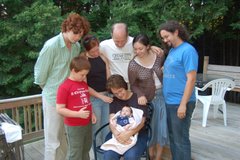This morning I was sitting on the porch reading Walden when Marilyn knocked on the glass door and invited me to go with her to church. The sun had come out through the clouds and the blossoms were tentatively opening to the warmth. Yes, I'd love to go to church.
We drove to the First Congregational Church in Old Lyme, where a woman stopped us on the stairs. "It was so good at nine I had to come and hear it again," she said of the sermon we were about to hear.
But first a word about the ambiance. The town was in full blossom--magnificent magnolias in full magenta-lavender bloom, sunny forsythia abundant and golden, the lawns fresh and green--all amidst quaint
Inside the church was painted white with gold trim and had old-fashioned pews: a typical nineteenth century New England Congregational Church with a lavish fresh bouquet of white flowers on the altar. The mostly female, mostly gray-haired choir sang beautifully. And the organ accompanied familiar hymns--"God of Grace and God of Glory" and "I Love to Tell the Story." The prayers were soulful and intelligent, expressing gratitude for the spring weather and sorrow at violence here and around the world. Usually I prefer Emily Dickinson's garden services, with a "boblink for a chorister," but this morning the service was worth being indoors for. Senior pastor David C. Good gave a rousing and passionate sermon on the Virginia Tech shootings, using a text from Wordsworth's "Ode: Intimations of Immortality From Recollections of Early Childhood." His reading of the excerpt made me want to hear him read Wordsworth aloud forever. Here are the first two stanzas of Wordsworth's Ode:
THERE was a time when meadow, grove, and stream,
The earth, and every common sight,
To me did seem
Apparelled in celestial light,
The glory and the freshness of a dream.
It is not now as it hath been of yore;--
Turn wheresoe'er I may,
By night or day,
The things which I have seen I now can see no more.
II
The Rainbow comes and goes,
And lovely is the Rose,
The Moon doth with delight
Look round her when the heavens are bare,
Waters on a starry night
Are beautiful and fair;
The sunshine is a glorious birth;
But yet I know, where'er I go,
That there hath past away a glory from the earth.
Of course, the glory that "hath past away" became, in Good's sermon, a description of the beautiful and talented young people, the professors, and even the killer himself, who were shot in this twisted display of violence and mental illness--for if each one of us is a manifestation of the creator's love, even the young man and his fearfully shaken family are included. He also mentioned that on the day of the shooting nine American soldiers were killed in
When I teach Wordsworth's Ode, I explain that the poet feels that a "glory hath past away . . . from the earth" because he senses he has lost the direct connection with the power of nature he felt in childhood. As we age and are shaped by the human world, we grow cataracts, as it were, over our senses and our souls. So it is not just in tragedy, but in the living of life itself, that this glory passes away. Such tragedies at the shooting at Virginia Tech shock us into feeling briefly, but afterwards we become even more numbed, more removed. Reverend Good mentioned that his memories of
1) Support universal health and mental health care, so that the mentally ill among us might have treatment.
2) Support the banning of handguns, assault weapons, semi-automatic and automatic guns.
3) Actively influence the shaping of culture by providing an imaginative vision of what society can be, rather than allowing our children and ourselves to be scripted by violent fantasies in everything from movies to video games, by the polarization of the issues on which the media describes. Yes, fantasy does matter, he asserted. The killer in
At the end of the sermon the congregation gave him a hearty round of applause, which is not something, Marilyn told me, they usually do. His words are so right, yet the situation seems so hopeless. But to have someone continually articulate the "right things" that must be done is at least an encouragement. If David C. Good were running for President, I’d vote for him. I noticed the church has a website and posts the sermons, so I’ll look forward to reading it again.
When we came back to Soul Mountain, I read through the Sunday Times and pored over an article on Boy Soldiers in Africa--over 300,000 now--and another on the weakening of the influence of the US Saudi connection with Prince Bandar. Wrapped up together with the sermon, these thought found their form in a poem I've been working on: "Why We Fear the Self" that uses a rap rhythm to question the ways in which our complicity with violence is fueled by our fears of facing and being our true selves.





















